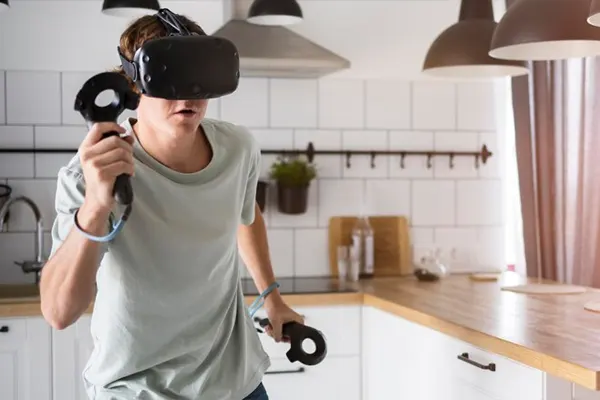Things Hotel Recruiters Look for in Industrial Training Experience
Read More
n today’s fast-paced hospitality industry, hotel training is more essential than previously. According to guests, hotels have to be sure their staff is prepared to provide impeccable service.
While these traditional training methods (manual, video, and role-playing) have been effective, they are not engaging and do not apply to the real world. Virtual reality (VR), a next-generation technology, is changing how hotel staff learn, practice, and perfect skills

In many industries, virtual reality has been embraced, but not any more so than in hospitality. It is a risk-free, interactive, and immersive environment that can be used by the employees for experiencing real-life situations without actual consequences.
VR-based training can be for just front desk operations, housekeeping, or anything; it is especially helpful if staff can do a drill practice and enhance their skills quickly and confidently.
Traditional training uses theoretical knowledge, and VR training puts employees into lifelike training environments, where they can practice and learn in action. Suppose a front desk trainee could handle guest check-ins, complaints, and special requests as parts of a simulated environment before encounters with real guests.
There are studies that show that interactive training methods are significantly better in terms of information retention. The VR training is highly engaging and memorable so that employees learn and retain the knowledge better than with the passive learning method. Reading customer service etiquette neither helps nor is it possible in actual customer service; however, staff can simulate actual interactions with guests in a real-time situation with the help of the simulator.
At the time of implementation, VR is expensive, but in the long run, it is a cost-effective investment. This can also free up hotels from some costs incurred with physical training spaces, printed materials, and instructor fees. Additionally, VR training can make it standardized for multiple locations so that 3rd-party staff development is standardized across all properties.
Hotel operations have some aspect of training that needs to occur in the high-pressure or high-urgency situations of fire evacuation, medical emergency, or even dealing with difficult guests. One of VR’s benefits is how it creates a safe space where employees can practice their response without risking their lives in the real world and be prepared for something that may happen to them.
VR technology can monitor their progress, providing personal feedback on areas that may require improvement. Whereas one size fits all type of training programs, VR opportunity offers personalized learning experiences for the varied job roles and skill levels in the hotel.
VR training can help receptionists and front-desk staff to improve their communication skills, maintain the expectations of the guests, and solve the stressful situation adequately. These trainees will be able to talk to virtual guests, do upselling of the hotel services, and learn to resolve complaints.
VR can be utilized to train housekeeping staff on the way to keep cleanliness standards, hold all the special guest’s belongings, and respond to the particular requests shortly. They can also practice in a simulated setting the failure of equipment and attempt to troubleshoot it before really having to deal with a real-world situation.
VR simulations will enable waitstaff, bartenders, and chefs to learn their service etiquette and kitchen operations in engaging ways. This helps to keep things smooth and ensure smooth service execution and a better guest dining experience.
The staff preparation for unexpected emergencies in hotels is another task to be performed. VR-based training lets its employees practice fire evacuation procedures, security threats, or medical emergencies without risks to their lives.
In addition, VR can help hotel sales teams practice presenting amenities of the hotel to potential clients and initiate realistic interactions with customers. They have the freedom to improve their pitch and enhance revenue generation.
Clearly, there is potential for the integration of VR in hotel training to become even more sophisticated as technology advances. Real-time feedback along with AI-driven virtual trainers and personalized training modules will only improve the learning experience. Those hotels that invest in VR training today are paving the way in employee development, making their teams ready and able to give excellent service.
Hotel staff training has gotten a virtual reality boost with virtual reality that is more interactive, less expensive, and more standardized. Hotels can efficiently train their employees, improve customer service with VR, and increase overall operational efficiency. VR will become a fundamental part of the future in workforce training in the hospitality industry.
Are you looking to upgrade your hotel training program? Based on the latest RSR Technology VR concept, RSR Training provides unique, cutting-edge VR solutions for the hospitality industry. Start using VR for staff training today!
